
- •Note to the Student from the Publisher
- •1 Nouns
- •2 Pronouns
- •3 Adjectives
- •4 Determiners
- •5 Verbs and Tenses
- •6 Auxiliary Verbs
- •7 Adverbs and Adverb Phrases
- •8 Prepositions and Prepositional Phrases
- •9 Conjunctions
- •10 Sentences
- •11 Direct and Indirect Speech
- •12 Punctuation
- •A List of Irregular Verbs
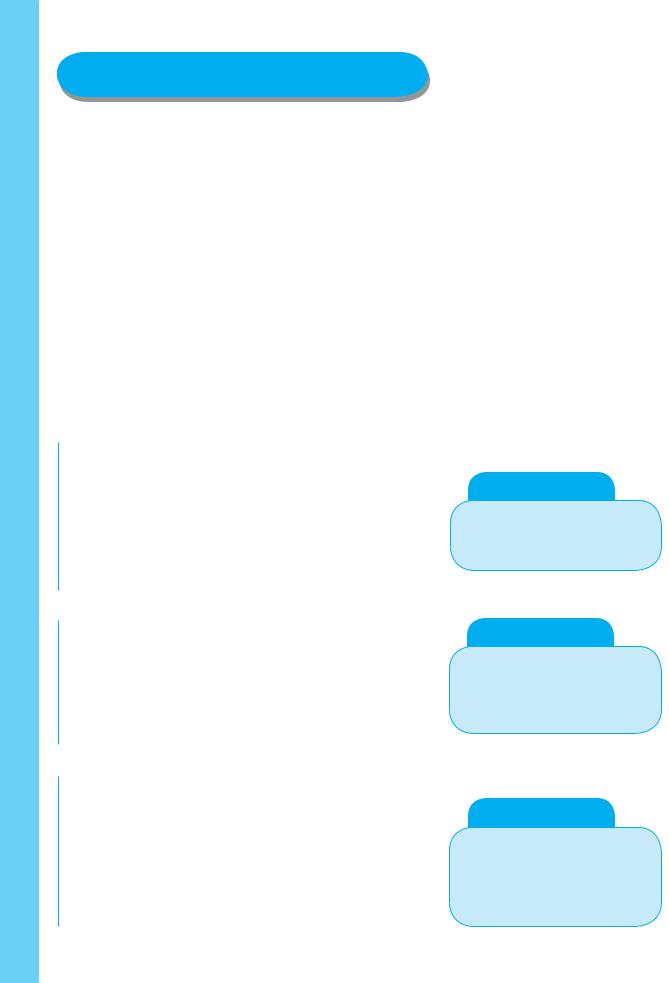
10 Sentences
A sentence is a group of words that expresses a complete thought. Sentences always have a subject and a verb.
|
|
|
subject |
verb |
|
|
|
|
She |
is working. |
|
|
|
|
He |
is reading. |
|
|
|
|
The children |
are playing. |
|
|
|
|
They |
are singing. |
|
|
|
|
|
|
|
Four Kinds of Sentence
A declarative sentence makes a statement.
It is raining.
Tom likes football.
The school bell was ringing.
The children are playing with the dog.
Topeka is in Kansas.
An interrogative sentence asks a question.
Where are my keys?
Why is the sky blue?
Who is talking to the teacher?
Is this the way to the ice skating rink?
An exclamatory sentence makes a very strong statement called an exclamation. It shows a strong feeling such as surprise or anger.
What a kind thing to do!
How beautiful she is!
The silly boy!
N o t e s
A declarative sentence ends with a period.
N o t e s
An interrogative sentence ends with a question mark
(?) instead of a period.
N o t e s
An exclamatory sentence ends with an exclamation point (!) instead of a period.
118

An imperative sentence gives an order.
Ask Tom to come and see me.
Don’t tell me lies.
Please leave.
Go to your room!
Speak up!
Sentences: Sentences with Objects
N o t e s
An imperative sentence can end with an exclamation point (!) if the order is very firm.
Sentences with Objects
The subject of a sentence often does something to another person or thing. The person or thing that receives the action of the subject is called the object of the verb. Verbs that have objects are called transitive verbs.
Here are some sentences with transitive verbs.
subject |
transitive verb |
object |
|
|
|
|
|
Dad |
is reading |
a book. |
|
|
|
|
|
I |
am cooking |
dinner. |
|
|
|
|
|
You |
have broken |
my new toy. |
|
|
|
|
|
Mom |
likes |
her new car. |
|
|
|
|
|
She |
has forgotten |
her backpack. |
|
|
|
|
|
The dog |
licked |
my face. |
|
|
|
|
|
Our ball |
hit |
a window. |
|
|
|
|
|
They |
visited |
the museum. |
|
|
|
|
|
Anna |
is sewing |
a dress for her doll. |
|
|
|
|
|
Uncle Ben |
sent |
a package to his friend. |
|
|
|
|
|
|
|
119 |
|

Sentences: Verbs with Two Objects; Verbs with No Object
Verbs with Two Objects
Some verbs have two objects. Look at the sentence below.
Sam gave Anna |
a present. |
||
|
▲ |
|
▲ |
|
indirect object |
|
direct object |
|
|
|
|
The thing that Sam gives is ‘a present’, so a present is the direct object of the verb. But there is another object: ‘Anna’. ‘Anna’ is the person that receives the present, so Anna is the indirect object of the verb. Many verbs have both direct and indirect objects. Here are some examples.
subject |
verb |
indirect object |
direct object |
|
|
|
|
Dad |
is reading |
the children |
a story. |
|
|
|
|
Grandma |
is baking |
me |
a cake. |
|
|
|
|
A kind man |
showed |
us |
the way. |
|
|
|
|
We |
have brought |
you |
some new magazines to read. |
|
|
|
|
Mr. Berg |
is teaching |
the children |
French. |
|
|
|
|
Jack |
asked |
the teacher |
a question. |
|
|
|
|
I |
am writing |
my friend |
a letter. |
|
|
|
|
She |
sent |
her cousin |
an email. |
|
|
|
|
John |
has found |
us |
a secret place to play. |
|
|
|
|
Uncle Andy |
told |
them |
the good news. |
|
|
|
|
Verbs with No Object
Some verbs don’t have an object. A verb that does not have an object is called an intransitive verb. Here are some sentences with intransitive verbs.
Mr. Park usually walks to work. |
Anna talks a lot in class. |
The sun is shining. |
It is snowing. |
I don’t know. |
We have already eaten. |
The man smiled. |
Dad always drives carefully. |
Miss Lee always dresses very smartly. |
Can your little brother read? |
120

Exercise 1
Tell whether each sentence below is a declarative sentence, an interrogative sentence, an exclamatory sentence or an imperative sentence.
The first one has been done for you.
1.The girls were playing volleyball.
2.Where is my bike?
3.What a lovely dog!
4.It’s snowing again today.
5.Please show me that pair of black shoes.
6.Can Anna come out to play?
7.Do your homework now.
8.What time is it?
9.Pass me the orange juice, please.
10.On weekends, I often go fishing with Dad.
11.Can your little brother read?
12.Speak in a loud, clear voice.
13.That was a fantastic game!
14.What fun this is!
15.Jamal really likes horses.
declarative sentence
Exercise 2
Underline the verbs in these sentences. Then tell whether each verb is transitive or intransitive. Put a checkmark in the correct box.
transitive verb |
intransitive verb |
1. Dad is baking bread.
2. We buy our food at the supermarket.
3. We are learning Latin.
4. Come with me now.
5. The children went to bed.
121
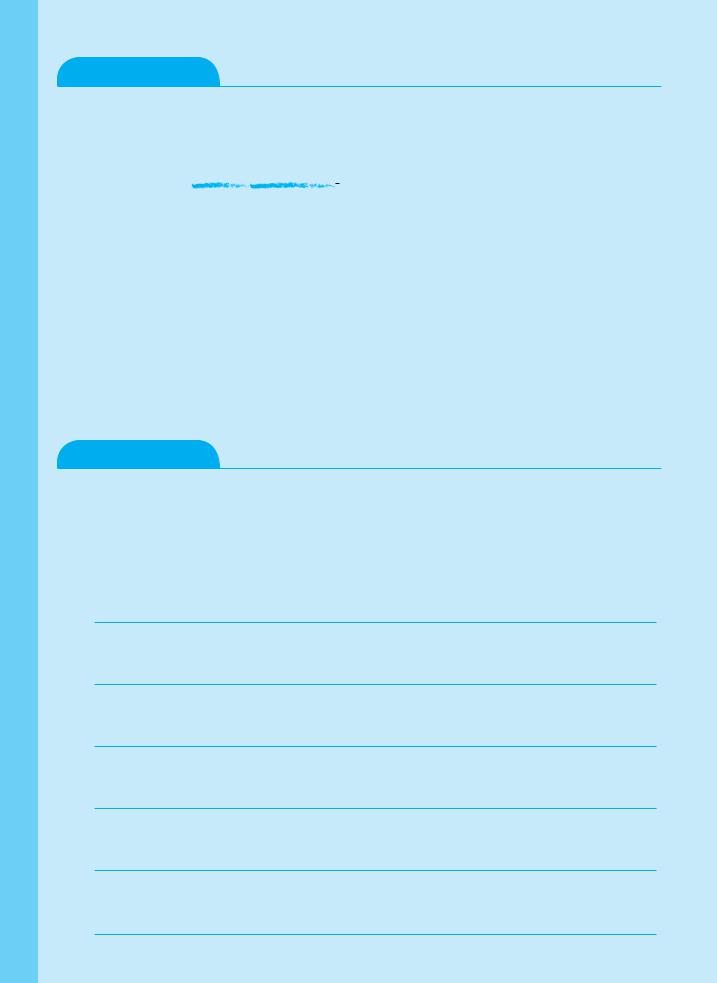
Exercise 3
Underline the objects in the following sentences. Write D for direct object or I for indirect object above each one. The first one has been done for you.
ID
1.Uncle Bill gave Michael some money.
2.Mom is baking us a chocolate cake for Christmas.
3.The children crossed the road safely.
4.Please pass me that pencil.
5.Henry sent Sam a letter from Japan.
6.I’ve forgotten your name.
7.She’s always giving her students advice.
8.We gave Dad a watch for his birthday.
Exercise 4
All the following sentences have verbs with direct objects. Rewrite each sentence, adding an indirect object to it. For example, for the first sentence you could write:
Dad bought Mom some flowers.
1.Dad bought some flowers.
2.The teacher found an empty seat.
3.The police officer showed her badge.
4.Rudy sent a postcard.
5.Will you buy some bread at the supermarket ?
6.I’ll bring my stamp collection.
122

Sentences: Simple Sentences; Compound Sentences
Simple Sentences
A clause is a group of words that contains one subject and one verb. A sentence that consists of one clause is called a simple sentence. Here are some examples. The subjects are printed in bold and the verbs are printed in color.
The girls are playing baseball.
Sally found a good hiding place.
I am eating my breakfast.
Tom is wearing his new shoes today.
Will you help me?
The sky was very cloudy.
I can hear the birds.
Everyone was happy.
Is it raining again?
Compound Sentences
A compound sentence contains two clauses joined by a conjunction such as and, or, but or so. Look at these examples. The verbs in the clauses are printed in color. Notice that there are two verbs, one on each side of the conjunction.
Some people are always happy and some people are always sad. She opened the bag and took out a book.
Do you want coffee or would you prefer lemonade?
Is that a bird or is it a plane?
John is good at English but he’s not very good at math.
Michael wants to see Star Wars but his friends have already seen it.
Tom dropped his sandwich so I gave him mine.
It started to rain so we went inside.
123

Sentences: Conditional Sentences; Positive and Negative Sentences
Conditional Sentences
To talk about things that are possible, you often use if in a sentence.
A sentence with if is called a conditional sentence. Here is an example of a conditional sentence with the if-clause printed in color.
If it rains tomorrow, we shall not go to the beach.
▲▲
simple present |
shall/will + infinitive |
tense verb |
|
|
In the if-clause, use a verb in the simple present tense. In the main clause, use shall or will and an infinitive. Here are some more examples. The if-clauses are in color and the main clauses are in bold print.
If there’s no rice in the cupboard, we’ll buy some more.
If we don’t work hard, we’ll never learn.
If we leave now, we’ll arrive on time.
You may also put the main clause before the if-clause.
We’ll play indoors if it rains.
You’ll get sick if you don’t eat good food.
Sam will do well in his piano recital if he practices regularly.
Positive and Negative Sentences
A positive sentence tells you about something that exists or something that is happening.
I like ice cream.
Michael is my brother.
The train leaves at five o’clock.
I’m feeling really tired.
She’s finished her homework.
Dad is in the kitchen.
There’s a cartoon on TV.
124
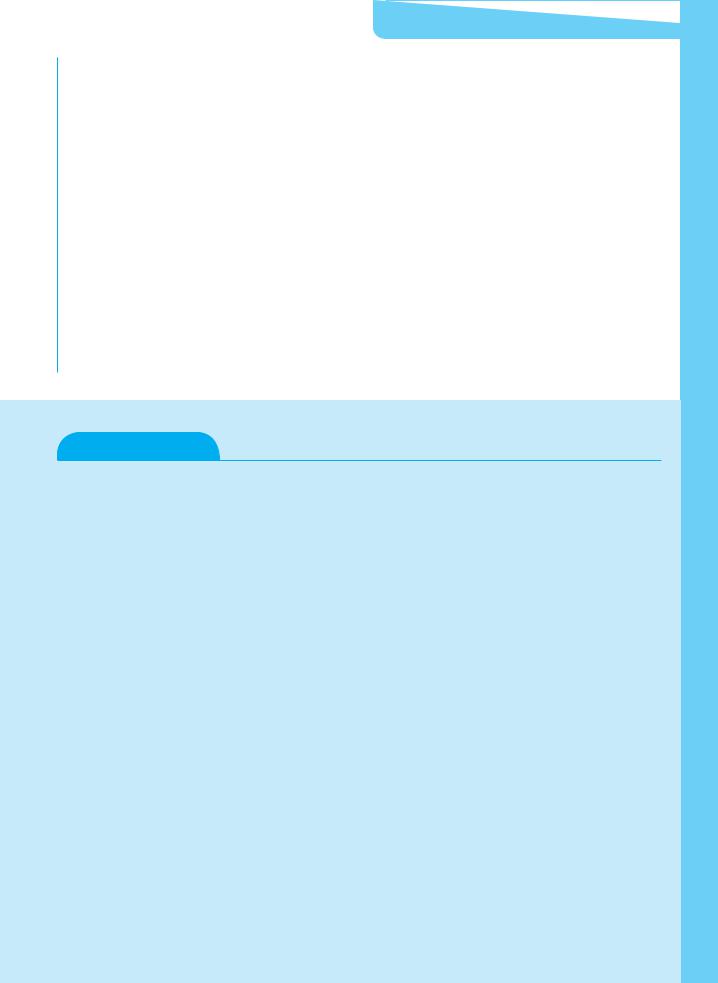
Sentences: Positive and Negative Sentences
A negative sentence contains the word not or another negative word. Negative sentences tell you that something does not exist or is not happening. Here are some examples. The negative words are printed in bold.
I’m not very good at math.
Tom isn’t as tall as Alan.
We didn’t hear you shout at us.
Meera hasn’t read the Harry Potter books.
People can’t see very well in the dark.
There’s nothing interesting on TV tonight.
We’ve never been to China or Japan.
Nobody knows my secret.
There are no coins in my pocket.
Exercise 5
Are the following sentences simple sentences or compound sentences? Put a checkmark ( ) in the correct box. For each compound sentence you marked, write the conjunction in the blank space next to it. The first one has been done for you.
|
simple |
compound |
|
||||
|
sentence |
sentence |
|
||||
|
|
|
|
|
|
|
and |
1. |
The sun is shining and the sky is blue. |
|
|
|
|
|
|
|
|
|
|
|
|||
|
|
|
|
|
|
|
|
|
|
|
|
|
|
||
2. |
Mom doesn’t like spiders. |
|
|
|
|
|
|
|
|
|
|
|
|
||
|
|
|
|
|
|
|
|
|
|
|
|
|
|
||
3. |
Eat plenty of fruit and vegetables. |
|
|
|
|
|
|
|
|
|
|
|
|
|
|
|
|
|
|
|
|
|
|
|
|
|
|
|
|
||
4. |
Would you like rice or do you prefer pasta? |
|
|
|
|
|
|
|
|
|
|
|
|
|
|
|
|
|
|
|
|
||
5. |
Is your bag red or green? |
|
|
|
|
|
|
|
|
|
|
|
|
|
|
|
|
|
|
|
|
||
6. |
Sam saw me and he waved. |
|
|
|
|
|
|
|
|
|
|
|
|
|
|
|
|
|
|
|
|
||
7. |
Pass me the dictionary, please. |
|
|
|
|
|
|
|
|
|
|
|
|
|
|
|
|
|
|
|
|
||
8. |
I’ve never been to Ohio or Indiana. |
|
|
|
|
|
|
|
|
|
|
|
|
||
|
|
|
|
|
|
|
|
|
|
|
|
|
|
||
9. |
Our new teacher is a young man. |
|
|
|
|
|
|
|
|
|
|
|
|
||
|
|
|
|
|
|
|
|
|
|
|
|
|
|
||
10. |
Switch off the light and go to sleep. |
|
|
|
|
|
|
|
|
|
|
|
|
||
|
|
|
|
|
|
|
|
125

Exercise 6
Match the if-clauses in the box with the main clauses below. Write two sentences for each pair of clauses. The first one has already been done for you.
if they get no water |
if you don’t write neatly |
if we all work together |
if we don’t leave now |
if you let me explain |
if I need help |
if you don’t want to see this movie |
if you work hard |
1. you’ll do well in your exams
If you work hard, you’ll do well in your exams.
You’ll do well in your exams if you work hard.
2.we’ll be late
3.I won’t be able to read your story
4.we’ll choose a different movie
5.the plants will die
6.we’ll finish the job more quickly
126
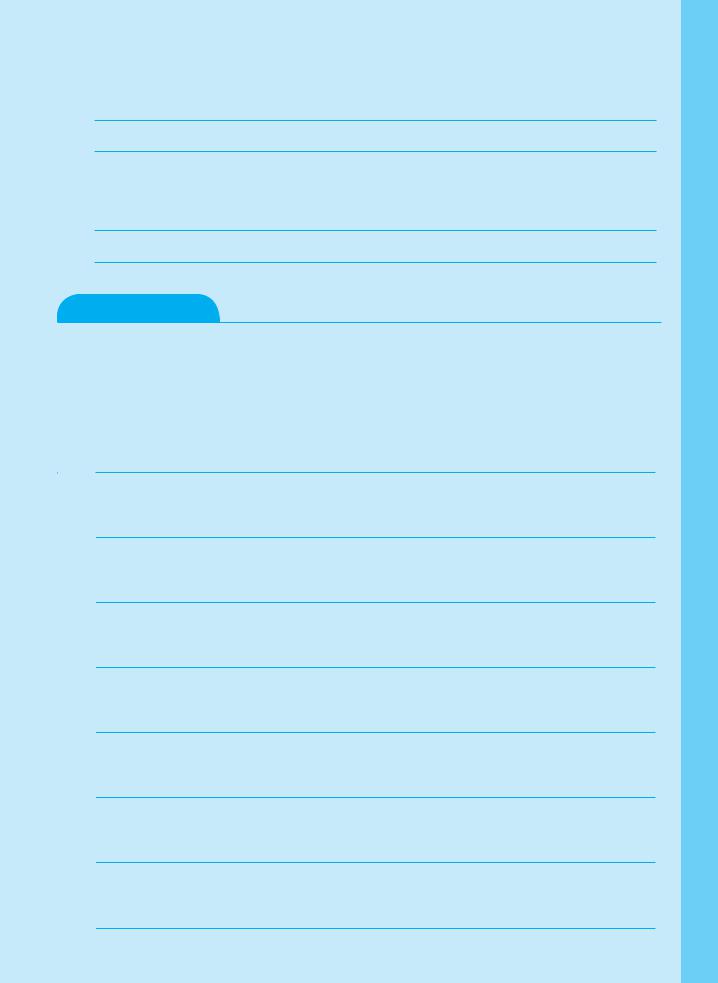
7.I’ll tell you what happened
8.I’ll ask Mom and Dad
Exercise 7
Rewrite the following sentences to make them negative. Use negative words such as no, not and never. Use contractions in some of your sentences. The first one has been done for you.
1. Children like chocolate.

 Children don’t like chocolate.
Children don’t like chocolate.
2.John is my best friend.
3.I’ve got a new bike.
4.Everybody knows where I live.
5.There’s some food in the refrigerator.
6.I saw the boy throw the stone.
7.We want to go to the ballgame.
8.Sam always tells the truth.
127

Sentences: Questions
Questions
There are two kinds of questions: yes or no questions and question-word questions.
yes or no questions
When you ask a yes or no question, you want the answer yes or the answer no. Use the verbs be, have and do along with helping verbs such as can, will and should when you ask these questions. Here are some examples of yes or no questions, with answers.
Is this your seat? |
May I sit here? |
Yes. |
Yes. |
Can you ride a bike? |
Don’t you like pizza? |
No. |
No. |
Do you like swimming? |
Are we late? |
Yes. |
No. |
In questions, the helping verb comes before the subject. The other verb comes after the subject. The verb be also comes before the subject when it is an ordinary verb rather than a helping verb.
Here are some examples of statements and the questions you can make from them. Notice that the helping verbs are printed in bold and the subjects are in color.
statement |
question |
Dad is ill today. |
Is Dad ill today? |
She has finished her homework. |
Has she finished her homework? |
The cat doesn’t like noise. |
Doesn’t the cat like noise? |
Michael can ride a bike. |
Can Michael ride a bike? |
Sally could borrow your pencil. |
Could Sally borrow your pencil? |
You may leave now. |
May I leave now? |
I think it will rain tomorrow. |
Do you think it will rain tomorrow? |
I saw Tom at the football game. |
Did you see Tom at the football game? |
Miss Lee sang a song. |
Did Miss Lee sing a song? |
The computer needs to be repaired. |
Does the computer need to be repaired? |
128

Sentences: Question-word questions
Question-word questions
Use the question words what, which, who (sometimes whom), whose, when, where and how to ask for information. The verbs be, have and do, and helping verbs such as can, will and should are also used in questions.
The helping verb comes before the subject, as it does in yes or no questions. Here are some examples. Again, the helping verb is printed in bold and the subject is printed in color.
What is your name?
What date is it today?
Which boy is your brother?
Which house do you live in?
Who is the boy next to Alan?
Who (or Whom) did he ask?
Whose book is this?
When can I come to visit you?
When does the spring vacation start?
Where is the pencil that I left on my desk?
Where do the birds go when they fly away in winter?
How can Grandma read without her glasses?
How does a plane stay in the sky?
Sometimes the wh-word itself is the subject of the sentence. In this case, don’t use do to form questions.
Who wants to come with me?
What caused the accident?
Which is the fastest car?
I’ve got my coat. Whose is this?
129

Sentences: Question Tags
Question Tags
Sometimes people finish what they are saying with a short question. Why do they do this? Because they want to know if the person they are speaking to agrees with them. This short question is called a question tag. Look at the following sentence.
The weather is lovely today, isn’t it?
The main part of the sentence is positive, but the question tag is negative. You expect the answer to a negative question tag to be yes. For example:
“The weather is lovely today, isn’t it?” “Yes, it is.”
Use a helping verb and the subject of the sentence to make the question tag. Notice that the subject has been replaced by a pronoun in the example sentences. The pronoun in the question tag refers to the subject printed in color.
Tom is older than you, isn’t he?
Sally has got a dog, hasn’t she?
Anna and I can go by train, can’t we?
Peter and David should leave now, shouldn’t they?
If the main part of the sentence has I am in it, use aren’t I in the question tag.
I’m your best friend, aren’t I?
I’m taller than Sumiko, aren’t I?
If the main part of the sentence is negative, the question tag is positive. You expect the answer to a positive question tag to be no.
These questions aren’t very difficult, are they?
You haven’t read this book, have you?
Peter isn’t as tall as I am, is he?
She isn’t eight yet, is she?
There aren’t many clouds in the sky, are there?
There isn’t much wind today, is there?
There weren’t any emails for me, were there?
130
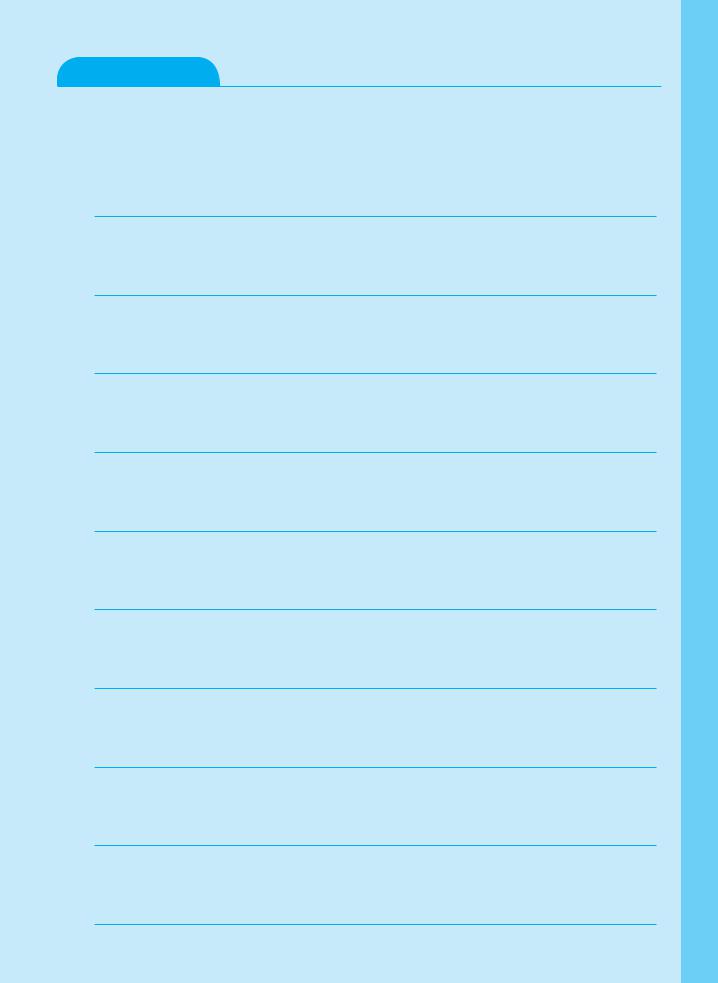
Exercise 8
Rewrite the following statements as yes or no questions. The first one has already been done for you.
1.It is raining again.
Is it raining again?
2.She can speak Japanese.
3.Margaret is at home.
4.My mom works in an office.
5.The teacher told the children a story.
6.Philip has got a new bike.
7.She is Sumiko’s best friend.
8.Tom could sit with David.
9.Dad will help Jennifer with her homework.
10.We will be late.
131

Exercise 9
Choose one of the question words from the box to complete the sentences below. You may use some of the words more than once. The first one has been done for you.
|
|
what |
|
who |
when |
why |
||
|
|
which |
|
whose |
where |
how |
||
1. |
|
|
Where |
are my keys? |
|
|
||
2. |
|
|
|
|
is the tall boy at the back of the class? |
|
||
3. |
|
|
|
|
time did they arrive? |
|
|
|
4. |
|
|
|
|
is the problem? |
|
|
|
5. |
|
“ |
|
|
|
are we going to the zoo?” |
“Tomorrow.” |
|
6. |
|
|
|
|
do you know the answer? |
|
|
|
7. |
|
|
|
|
do the stars twinkle? |
|
|
|
8. |
|
|
|
|
coat is this? |
|
|
|
9. |
|
|
|
|
would you like for dinner? |
|
|
|
10. |
|
|
|
|
did you open the door without a key? |
|
||
11. |
|
|
|
|
is your favorite singer? |
|
|
|
12. |
|
|
|
|
does this train leave? |
|
|
|
13. |
|
|
|
|
bike is that over there? |
|
|
|
14. |
|
|
|
|
cafe do you prefer? |
|
|
|
15. |
|
|
|
|
can we find a restaurant? |
|
|
|
132

Exercise 10
Complete the following sentences by adding a question tag. Remember that a positive sentence needs a negative question tag, and a negative sentence needs a positive question tag. The first one has been done for you.
1. |
This is your house, |
|
|
|
isn’t it |
? |
|
|
|
|
|
|
|
|
|
|
|
|
|
|
|
|
|
|
|
|
|
|
|
||||||||||
2. |
That isn’t the right answer, |
|
|
|
|
|
|
|
|
|
|
|
|
? |
|
|
|
|
|
|
|
|
|
|
|
|
|
|
|
||||||||||
3. |
Your sister is very pretty, |
|
|
|
|
|
|
|
|
|
|
|
|
|
|
|
? |
|
|
|
|
|
|
|
|
|
|
|
|
|
|
|
|
|
|||||
4. |
Andrew can’t ride a bike, |
|
|
|
|
|
|
|
|
|
|
|
|
|
|
|
|
|
|
|
|
? |
|
|
|
|
|
|
|
|
|
|
|||||||
5. |
You’ve already seen that movie, |
|
|
|
|
|
|
|
|
|
|
|
|
|
|
|
|
|
|
? |
|
|
|
|
|
|
|||||||||||||
6. |
I’m lucky to have a friend like Alice, |
|
|
|
|
|
|
|
|
|
|
|
|
|
|
|
|
? |
|
|
|
|
|||||||||||||||||
7. |
The tunnel was very dark, |
|
|
|
|
|
|
|
|
|
|
|
|
|
|
|
|
|
|
|
? |
|
|
|
|
|
|
|
|
|
|
||||||||
8. |
They didn’t play very well, |
|
|
|
|
|
|
|
|
|
|
|
|
|
|
|
|
|
|
? |
|
|
|
|
|
|
|
|
|
||||||||||
9. |
We shouldn’t look at the answers first, |
|
|
|
|
|
|
|
|
|
|
|
|
|
|
|
? |
|
|||||||||||||||||||||
10. |
Aunt Sarah could come to our house for dinner, |
|
|
|
|
|
|
|
|
|
? |
||||||||||||||||||||||||||||
11. |
There was a bag in the car, |
|
|
|
|
|
|
|
|
|
|
|
|
|
|
|
|
|
? |
|
|
|
|
|
|
|
|
||||||||||||
12. |
Sally hasn’t got a dog, |
|
|
|
|
|
|
|
|
|
|
|
|
|
|
|
|
|
|
|
|
? |
|
|
|
|
|
|
|
|
|
|
|
|
|
||||
13. |
We mustn’t be late, |
|
|
|
|
|
|
|
|
|
|
|
|
|
|
|
|
|
|
|
|
? |
|
|
|
|
|
|
|
|
|
|
|
|
|
|
|||
14. |
There is a post office nearby, |
|
|
|
|
|
|
|
|
|
|
|
|
|
|
|
|
? |
|
|
|
|
|
|
|
||||||||||||||
15. |
There were some people in the park, |
|
|
|
|
|
|
|
|
|
|
|
|
? |
|
|
|
||||||||||||||||||||||
16. |
We can stay an extra day, |
|
|
|
|
|
|
|
|
|
|
|
|
|
|
|
? |
|
|
|
|
|
|
|
|
|
|||||||||||||
17. |
The journey won’t take long, |
|
|
|
|
|
|
|
|
|
|
|
|
|
|
? |
|
|
|
|
|
|
|
||||||||||||||||
18. |
I’m your best friend, |
|
|
|
|
|
|
|
|
|
|
|
|
|
|
|
|
|
|
|
? |
|
|
|
|
|
|
|
|
|
|
|
|
|
|
||||
19. |
Andrew and Susan are your neighbors, |
|
|
|
|
|
|
|
|
|
? |
|
|||||||||||||||||||||||||||
20. |
You didn’t see the dog in the garden, |
|
|
|
|
|
|
|
|
? |
|
|
|
||||||||||||||||||||||||||
133
